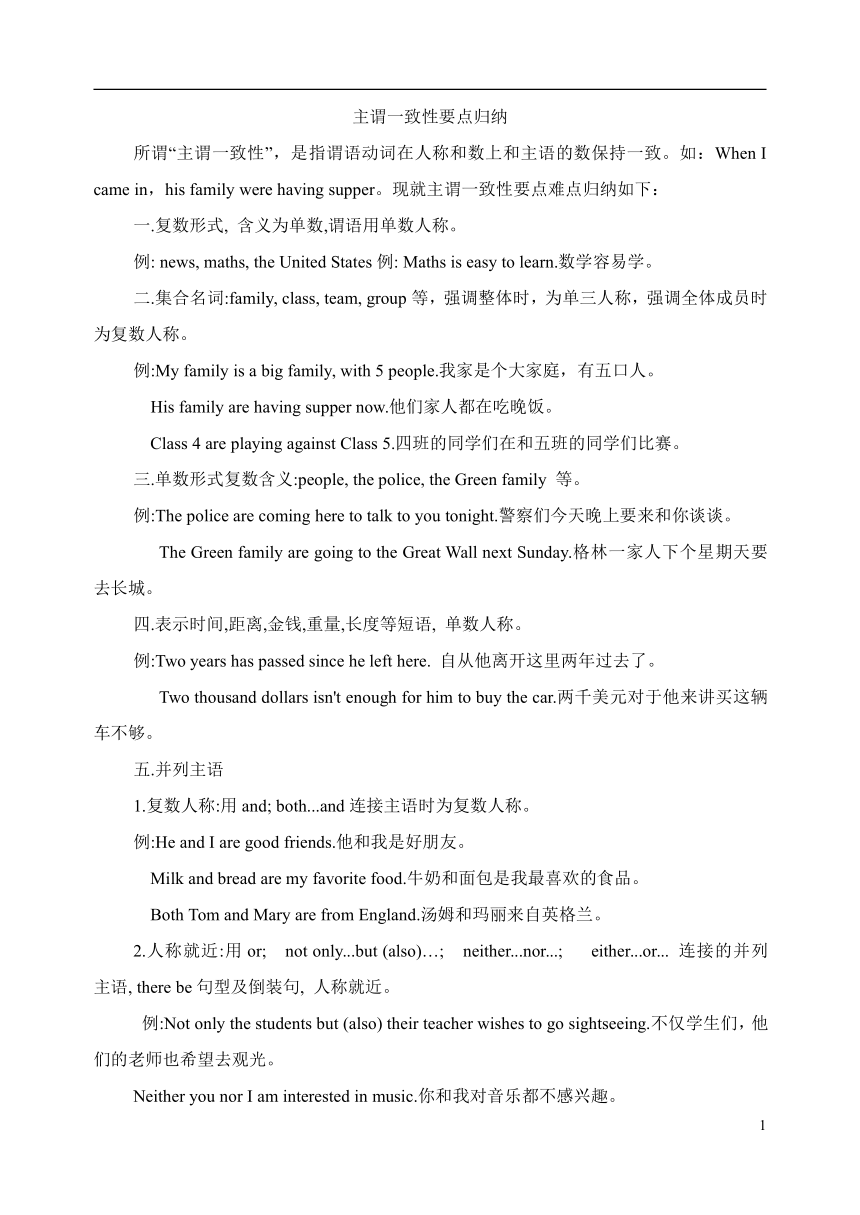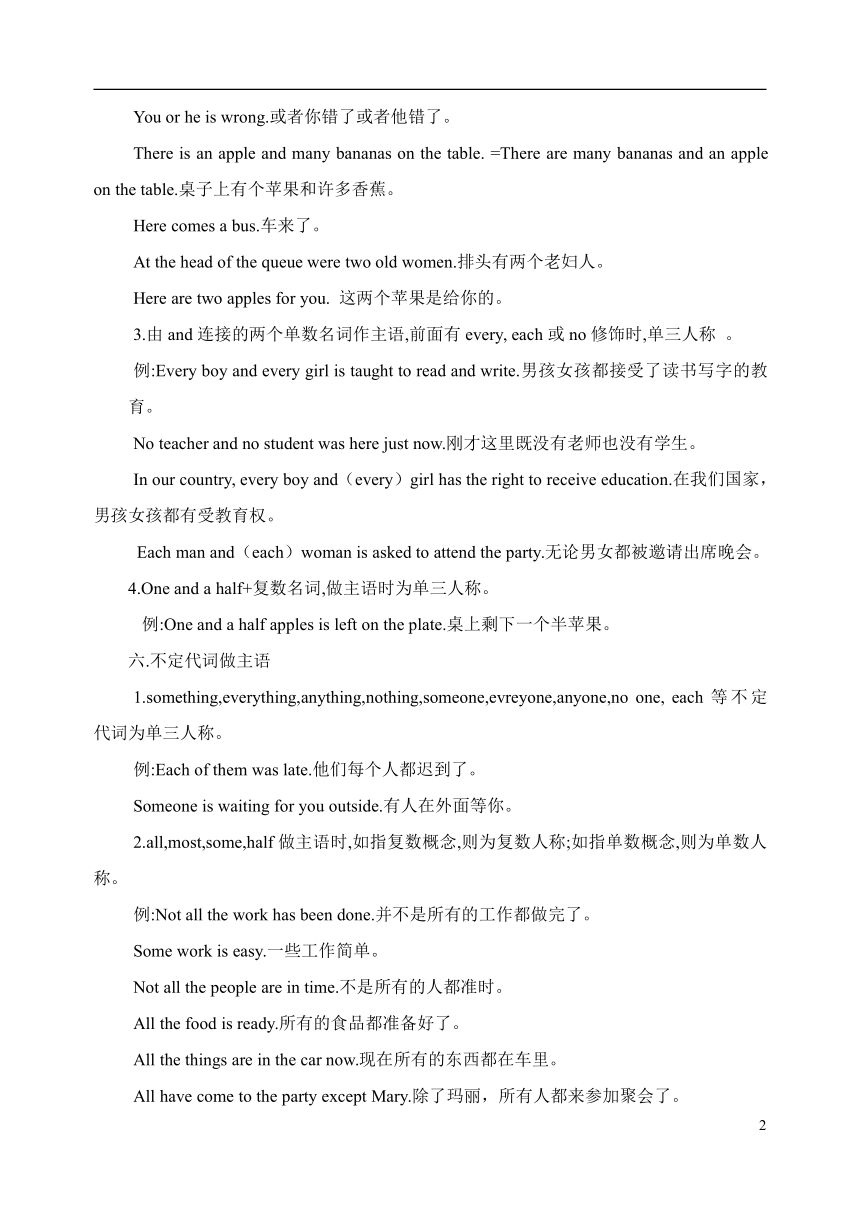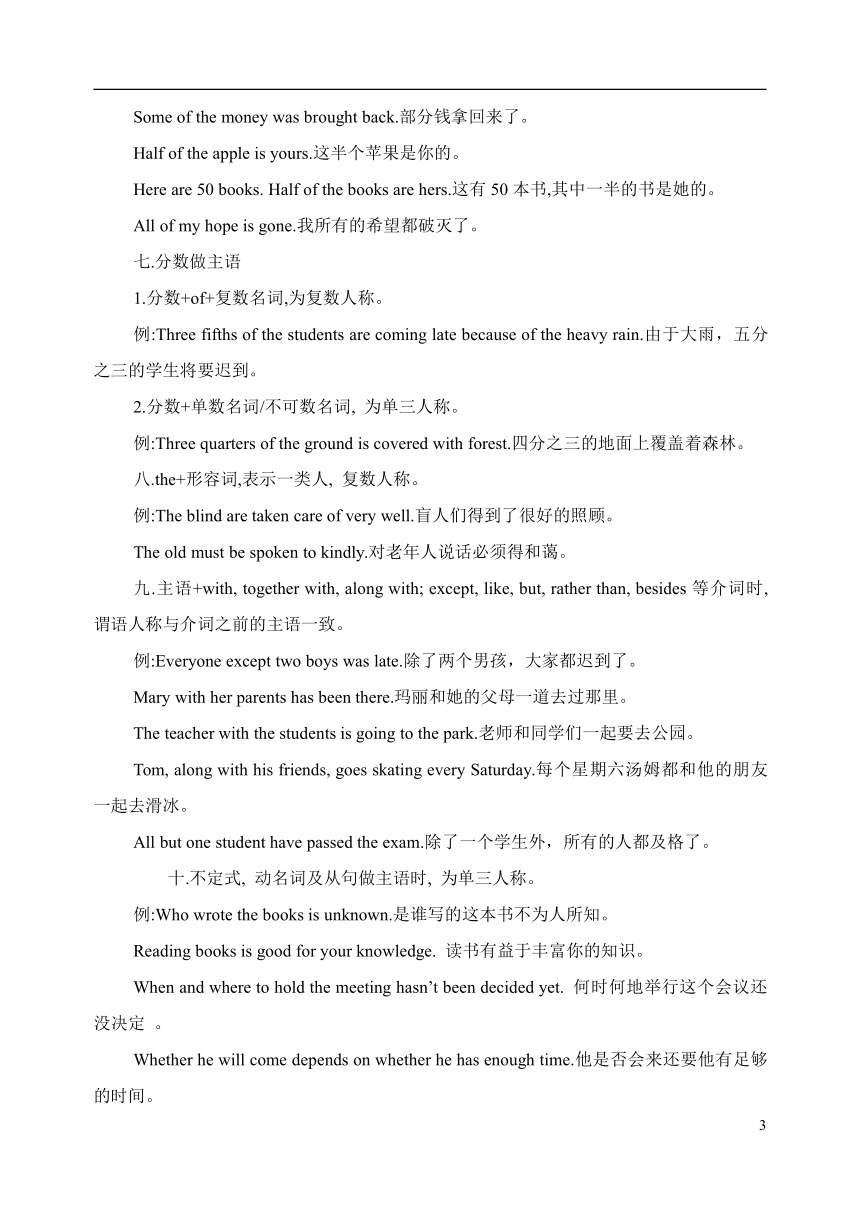主谓一致性要点归纳.[下学期]
图片预览



文档简介
主谓一致性要点归纳
所谓“主谓一致性”,是指谓语动词在人称和数上和主语的数保持一致。如:When I came in,his family were having supper。现就主谓一致性要点难点归纳如下:
一.复数形式, 含义为单数,谓语用单数人称。
例: news, maths, the United States例: Maths is easy to learn.数学容易学。
二.集合名词:family, class, team, group等,强调整体时,为单三人称,强调全体成员时为复数人称。
例:My family is a big family, with 5 people.我家是个大家庭,有五口人。
His family are having supper now.他们家人都在吃晚饭。
Class 4 are playing against Class 5.四班的同学们在和五班的同学们比赛。
三.单数形式复数含义:people, the police, the Green family 等。
例:The police are coming here to talk to you tonight.警察们今天晚上要来和你谈谈。
The Green family are going to the Great Wall next Sunday.格林一家人下个星期天要去长城。
四.表示时间,距离,金钱,重量,长度等短语, 单数人称。
例:Two years has passed since he left here. 自从他离开这里两年过去了。
Two thousand dollars isn't enough for him to buy the car.两千美元对于他来讲买这辆车不够。
五.并列主语
1.复数人称:用and; both...and连接主语时为复数人称。
例:He and I are good friends.他和我是好朋友。
Milk and bread are my favorite food.牛奶和面包是我最喜欢的食品。
Both Tom and Mary are from England.汤姆和玛丽来自英格兰。
2.人称就近:用or; not only...but (also)…; neither...nor...; either...or... 连接的并列主语, there be句型及倒装句, 人称就近。
例:Not only the students but (also) their teacher wishes to go sightseeing.不仅学生们,他们的老师也希望去观光。
Neither you nor I am interested in music.你和我对音乐都不感兴趣。
You or he is wrong.或者你错了或者他错了。
There is an apple and many bananas on the table. =There are many bananas and an apple on the table.桌子上有个苹果和许多香蕉。
Here comes a bus.车来了。
At the head of the queue were two old women.排头有两个老妇人。
Here are two apples for you. 这两个苹果是给你的。
3.由and连接的两个单数名词作主语,前面有every, each或no修饰时,单三人称 。
例:Every boy and every girl is taught to read and write.男孩女孩都接受了读书写字的教育。
No teacher and no student was here just now.刚才这里既没有老师也没有学生。
In our country, every boy and(every)girl has the right to receive education.在我们国家,男孩女孩都有受教育权。
Each man and(each)woman is asked to attend the party.无论男女都被邀请出席晚会。
4.One and a half+复数名词,做主语时为单三人称。
例:One and a half apples is left on the plate.桌上剩下一个半苹果。
六.不定代词做主语
1.something,everything,anything,nothing,someone,evreyone,anyone,no one, each等不定代词为单三人称。
例:Each of them was late.他们每个人都迟到了。
Someone is waiting for you outside.有人在外面等你。
2.all,most,some,half做主语时,如指复数概念,则为复数人称;如指单数概念,则为单数人称。
例:Not all the work has been done.并不是所有的工作都做完了。
Some work is easy.一些工作简单。
Not all the people are in time.不是所有的人都准时。
All the food is ready.所有的食品都准备好了。
All the things are in the car now.现在所有的东西都在车里。
All have come to the party except Mary.除了玛丽,所有人都来参加聚会了。
Some of the money was brought back.部分钱拿回来了。
Half of the apple is yours.这半个苹果是你的。
Here are 50 books. Half of the books are hers.这有50本书,其中一半的书是她的。
All of my hope is gone.我所有的希望都破灭了。
七.分数做主语
1.分数+of+复数名词,为复数人称。
例:Three fifths of the students are coming late because of the heavy rain.由于大雨,五分之三的学生将要迟到。
2.分数+单数名词/不可数名词, 为单三人称。
例:Three quarters of the ground is covered with forest.四分之三的地面上覆盖着森林。
八.the+形容词,表示一类人, 复数人称。
例:The blind are taken care of very well.盲人们得到了很好的照顾。
The old must be spoken to kindly.对老年人说话必须得和蔼。
九.主语+with, together with, along with; except, like, but, rather than, besides等介词时,谓语人称与介词之前的主语一致。
例:Everyone except two boys was late.除了两个男孩,大家都迟到了。
Mary with her parents has been there.玛丽和她的父母一道去过那里。
The teacher with the students is going to the park.老师和同学们一起要去公园。
Tom, along with his friends, goes skating every Saturday.每个星期六汤姆都和他的朋友一起去滑冰。
All but one student have passed the exam.除了一个学生外,所有的人都及格了。
十.不定式, 动名词及从句做主语时, 为单三人称。
例:Who wrote the books is unknown.是谁写的这本书不为人所知。
Reading books is good for your knowledge. 读书有益于丰富你的知识。
When and where to hold the meeting hasn’t been decided yet. 何时何地举行这个会议还没决定 。
Whether he will come depends on whether he has enough time.他是否会来还要他有足够的时间。
十一.and 连接的并列主语指同一个人或事物, 同一概念时, 为单三人称 。
例:The teacher and writer is from Shanghai.那个老师作家来自上海。
Fish and chips is a popular meal in Britain.在英国炸鱼薯片是很流行的食品。
十二.more than a/one+单数名词;many a+单数名词,单三人称 。
例:More than one student in our class has been to Beijing.我们班里不止一个学生去过北京。
Many a boy has always loved playing computer games after school.许多男孩一直喜欢放学后玩电脑游戏。
More than a boy in our class has watched the match.我们班里不止一个男孩看过这场比赛。
十三.一些形复意单的名词, 如:glasses, trousers, shoes, scissors,gloves等做主语时,复数人称。
例:My trousers are too old , I want to buy a new pair.我的裤子太旧了,我想买条新的。
Your glasses are new, aren’t they 你的眼镜是新的,不是吗
这类名词前经常用a pair of, pairs of来修饰,此时其人称取决于pair的单复数。
例:A pair of gloves is welcome present.手套是比较受欢迎的礼品。
Here are some new pairs of shoes for you.这几双新鞋是给你的。
补 充 练 习(单选题)
1.Twenty minutes (is, are) enough for me.
2.Each of us (have, has) done the work.
3.We each (have, has) been to the Great Wall.
4.Somebody (want, wants) to see you.
5.Who (is, are) often late
6.Mr Green with his sons (are, is) having supper at home.
7.No one except his sisters (know, knows) about it.
8.The Greens (are, is) watching TV.
9.Either he or you (are, is) right.
10.Either they or Tom (have, has) asked the question.
11.Neither he nor I (am, is, are) a teacher.
12.Here (is, are) a pencil and two books for you as your birthday presents.
13.Milk and juice (is, are) both delicious.
14.There (is, are) no meat and bread at home.
15.This pair of shoes (is, are) mine.
16.My family (is, are) all here.
17.His family (is, are) very small, with only two people.
18.Her family (is, are) all watching TV.
19.Fish (live,lives) in the water.
20.There (is, are) little sheep on the hill.
21.Sheep(is,are)white and milk (is, are) white, too.
22.A woman with 2 boys (is, are) working in the field.
23.Three years (has, have) passed since he left here.
24.There (is, are) a pair of shoes under the bed.
25.The shoes under the bed (is, are) mine.
26.More than one boy (has, have) been to the USA.
27.All (has, have) come to the party.
28.None of them (is, are) a good teacher.
29.None of them (is, are) workers.
30.They each (has, have) a good book.
31.The number of the books on the desk (is, are) ten.
32.Fish and chips (is, are) on the table.
33.The taller of the twins (like, likes, is like) swimming.
34.The black trousers on the bed (is, are) his, the blue ones (is, are) mine.
35.No news (is, are) good news.
36.Neither of us (has, have) much money.
37.Most of the food (is, are) good.
38.What color (is, are) the pens
39.The photo of the boys (is, are) on the wall.
40.Either of the books (is, are) mine.
41.Not only his parents but also Tom (is, are) invited to the party.
42.The boy like his parents often (go, goes) skating.
43.Nothing (has, have) happened outside.
44.At the head of the queue (was, were) my parents.
45.Half of the sheep (like, likes) to eat this kind of grass.
46.One third of the students in our class (was, were) late yesterday.
47.Ten minus six (is, are) four.
48.The police (is, are) searching the robber.
49.Each man and each woman (is, are, has, were) asked to attend the party.
50.What (do, does) people mean in Chinese
51.Half of the class (has, have) done most of the work.
52.Neither Mary nor her parents (have, has) been to Australia.
53.Either the girl or the boy (know, knows) me very well.
54. Every student and every teacher (was, were) late for school.
55.Half of the class (have, has) done most of the work. Some of it (is, are) really difficult.
补充练习答案:
1.is 2.has 3.have 4.wants 5.is 6.is 7.knows 8.are 9.are 10.has
11.am 12.is 13.are 14.is 15.is 16.are 17.is 18.are 19.live 20.are
21.are, is 22.is 23.has 24.is 25.are 26.has 27.have 28.is 29.are 30.have
31.is 32.is 33.likes 34.are, are 35.is 36.has 37.is 38.are 39.is 40.is
41.is 42.goes 43.has 44.were 45.like 46.were 47.is 48.are 49.is 50.does
51.have 52.have 53.knows 54.was 55. have, is
PAGE
7
所谓“主谓一致性”,是指谓语动词在人称和数上和主语的数保持一致。如:When I came in,his family were having supper。现就主谓一致性要点难点归纳如下:
一.复数形式, 含义为单数,谓语用单数人称。
例: news, maths, the United States例: Maths is easy to learn.数学容易学。
二.集合名词:family, class, team, group等,强调整体时,为单三人称,强调全体成员时为复数人称。
例:My family is a big family, with 5 people.我家是个大家庭,有五口人。
His family are having supper now.他们家人都在吃晚饭。
Class 4 are playing against Class 5.四班的同学们在和五班的同学们比赛。
三.单数形式复数含义:people, the police, the Green family 等。
例:The police are coming here to talk to you tonight.警察们今天晚上要来和你谈谈。
The Green family are going to the Great Wall next Sunday.格林一家人下个星期天要去长城。
四.表示时间,距离,金钱,重量,长度等短语, 单数人称。
例:Two years has passed since he left here. 自从他离开这里两年过去了。
Two thousand dollars isn't enough for him to buy the car.两千美元对于他来讲买这辆车不够。
五.并列主语
1.复数人称:用and; both...and连接主语时为复数人称。
例:He and I are good friends.他和我是好朋友。
Milk and bread are my favorite food.牛奶和面包是我最喜欢的食品。
Both Tom and Mary are from England.汤姆和玛丽来自英格兰。
2.人称就近:用or; not only...but (also)…; neither...nor...; either...or... 连接的并列主语, there be句型及倒装句, 人称就近。
例:Not only the students but (also) their teacher wishes to go sightseeing.不仅学生们,他们的老师也希望去观光。
Neither you nor I am interested in music.你和我对音乐都不感兴趣。
You or he is wrong.或者你错了或者他错了。
There is an apple and many bananas on the table. =There are many bananas and an apple on the table.桌子上有个苹果和许多香蕉。
Here comes a bus.车来了。
At the head of the queue were two old women.排头有两个老妇人。
Here are two apples for you. 这两个苹果是给你的。
3.由and连接的两个单数名词作主语,前面有every, each或no修饰时,单三人称 。
例:Every boy and every girl is taught to read and write.男孩女孩都接受了读书写字的教育。
No teacher and no student was here just now.刚才这里既没有老师也没有学生。
In our country, every boy and(every)girl has the right to receive education.在我们国家,男孩女孩都有受教育权。
Each man and(each)woman is asked to attend the party.无论男女都被邀请出席晚会。
4.One and a half+复数名词,做主语时为单三人称。
例:One and a half apples is left on the plate.桌上剩下一个半苹果。
六.不定代词做主语
1.something,everything,anything,nothing,someone,evreyone,anyone,no one, each等不定代词为单三人称。
例:Each of them was late.他们每个人都迟到了。
Someone is waiting for you outside.有人在外面等你。
2.all,most,some,half做主语时,如指复数概念,则为复数人称;如指单数概念,则为单数人称。
例:Not all the work has been done.并不是所有的工作都做完了。
Some work is easy.一些工作简单。
Not all the people are in time.不是所有的人都准时。
All the food is ready.所有的食品都准备好了。
All the things are in the car now.现在所有的东西都在车里。
All have come to the party except Mary.除了玛丽,所有人都来参加聚会了。
Some of the money was brought back.部分钱拿回来了。
Half of the apple is yours.这半个苹果是你的。
Here are 50 books. Half of the books are hers.这有50本书,其中一半的书是她的。
All of my hope is gone.我所有的希望都破灭了。
七.分数做主语
1.分数+of+复数名词,为复数人称。
例:Three fifths of the students are coming late because of the heavy rain.由于大雨,五分之三的学生将要迟到。
2.分数+单数名词/不可数名词, 为单三人称。
例:Three quarters of the ground is covered with forest.四分之三的地面上覆盖着森林。
八.the+形容词,表示一类人, 复数人称。
例:The blind are taken care of very well.盲人们得到了很好的照顾。
The old must be spoken to kindly.对老年人说话必须得和蔼。
九.主语+with, together with, along with; except, like, but, rather than, besides等介词时,谓语人称与介词之前的主语一致。
例:Everyone except two boys was late.除了两个男孩,大家都迟到了。
Mary with her parents has been there.玛丽和她的父母一道去过那里。
The teacher with the students is going to the park.老师和同学们一起要去公园。
Tom, along with his friends, goes skating every Saturday.每个星期六汤姆都和他的朋友一起去滑冰。
All but one student have passed the exam.除了一个学生外,所有的人都及格了。
十.不定式, 动名词及从句做主语时, 为单三人称。
例:Who wrote the books is unknown.是谁写的这本书不为人所知。
Reading books is good for your knowledge. 读书有益于丰富你的知识。
When and where to hold the meeting hasn’t been decided yet. 何时何地举行这个会议还没决定 。
Whether he will come depends on whether he has enough time.他是否会来还要他有足够的时间。
十一.and 连接的并列主语指同一个人或事物, 同一概念时, 为单三人称 。
例:The teacher and writer is from Shanghai.那个老师作家来自上海。
Fish and chips is a popular meal in Britain.在英国炸鱼薯片是很流行的食品。
十二.more than a/one+单数名词;many a+单数名词,单三人称 。
例:More than one student in our class has been to Beijing.我们班里不止一个学生去过北京。
Many a boy has always loved playing computer games after school.许多男孩一直喜欢放学后玩电脑游戏。
More than a boy in our class has watched the match.我们班里不止一个男孩看过这场比赛。
十三.一些形复意单的名词, 如:glasses, trousers, shoes, scissors,gloves等做主语时,复数人称。
例:My trousers are too old , I want to buy a new pair.我的裤子太旧了,我想买条新的。
Your glasses are new, aren’t they 你的眼镜是新的,不是吗
这类名词前经常用a pair of, pairs of来修饰,此时其人称取决于pair的单复数。
例:A pair of gloves is welcome present.手套是比较受欢迎的礼品。
Here are some new pairs of shoes for you.这几双新鞋是给你的。
补 充 练 习(单选题)
1.Twenty minutes (is, are) enough for me.
2.Each of us (have, has) done the work.
3.We each (have, has) been to the Great Wall.
4.Somebody (want, wants) to see you.
5.Who (is, are) often late
6.Mr Green with his sons (are, is) having supper at home.
7.No one except his sisters (know, knows) about it.
8.The Greens (are, is) watching TV.
9.Either he or you (are, is) right.
10.Either they or Tom (have, has) asked the question.
11.Neither he nor I (am, is, are) a teacher.
12.Here (is, are) a pencil and two books for you as your birthday presents.
13.Milk and juice (is, are) both delicious.
14.There (is, are) no meat and bread at home.
15.This pair of shoes (is, are) mine.
16.My family (is, are) all here.
17.His family (is, are) very small, with only two people.
18.Her family (is, are) all watching TV.
19.Fish (live,lives) in the water.
20.There (is, are) little sheep on the hill.
21.Sheep(is,are)white and milk (is, are) white, too.
22.A woman with 2 boys (is, are) working in the field.
23.Three years (has, have) passed since he left here.
24.There (is, are) a pair of shoes under the bed.
25.The shoes under the bed (is, are) mine.
26.More than one boy (has, have) been to the USA.
27.All (has, have) come to the party.
28.None of them (is, are) a good teacher.
29.None of them (is, are) workers.
30.They each (has, have) a good book.
31.The number of the books on the desk (is, are) ten.
32.Fish and chips (is, are) on the table.
33.The taller of the twins (like, likes, is like) swimming.
34.The black trousers on the bed (is, are) his, the blue ones (is, are) mine.
35.No news (is, are) good news.
36.Neither of us (has, have) much money.
37.Most of the food (is, are) good.
38.What color (is, are) the pens
39.The photo of the boys (is, are) on the wall.
40.Either of the books (is, are) mine.
41.Not only his parents but also Tom (is, are) invited to the party.
42.The boy like his parents often (go, goes) skating.
43.Nothing (has, have) happened outside.
44.At the head of the queue (was, were) my parents.
45.Half of the sheep (like, likes) to eat this kind of grass.
46.One third of the students in our class (was, were) late yesterday.
47.Ten minus six (is, are) four.
48.The police (is, are) searching the robber.
49.Each man and each woman (is, are, has, were) asked to attend the party.
50.What (do, does) people mean in Chinese
51.Half of the class (has, have) done most of the work.
52.Neither Mary nor her parents (have, has) been to Australia.
53.Either the girl or the boy (know, knows) me very well.
54. Every student and every teacher (was, were) late for school.
55.Half of the class (have, has) done most of the work. Some of it (is, are) really difficult.
补充练习答案:
1.is 2.has 3.have 4.wants 5.is 6.is 7.knows 8.are 9.are 10.has
11.am 12.is 13.are 14.is 15.is 16.are 17.is 18.are 19.live 20.are
21.are, is 22.is 23.has 24.is 25.are 26.has 27.have 28.is 29.are 30.have
31.is 32.is 33.likes 34.are, are 35.is 36.has 37.is 38.are 39.is 40.is
41.is 42.goes 43.has 44.were 45.like 46.were 47.is 48.are 49.is 50.does
51.have 52.have 53.knows 54.was 55. have, is
PAGE
7
同课章节目录
- 词法
- 名词
- 动词和动词短语
- 动词语态
- 动词时态
- 助动词和情态动词
- 非谓语动词
- 冠词
- 代词
- 数词和量词
- 形容词副词及其比较等级
- 介词和介词短语
- 连词和感叹词
- 构词法
- 相似、相近词比较
- 句法
- 陈述句
- 一般疑问句和否定疑问句
- 特殊疑问句及选择疑问句
- 反意疑问句
- 存在句(There be句型)
- 宾语从句
- 定语从句
- 状语从句
- 主谓一致问题
- 简单句
- 并列句
- 复合句
- 主谓一致
- 主、表语从句
- 名词性从句
- 直接引语和间接引语
- 虚拟语气
- 感叹句
- 强调句
- 倒装句
- 祈使句
- 句子的成分
- 句子的分类
- 题型专区
- 单项选择部分
- 易错题
- 完形填空
- 阅读理解
- 词汇练习
- 听说训练
- 句型转换
- 补全对话
- 短文改错
- 翻译
- 书面表达
- 任务型阅读
- 语法填空
- 其他资料
